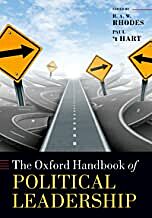Local Storage seems to be disabled in your browser.
For the best experience on our site, be sure to turn on Local Storage in your browser.
Political leadership has made a comeback. It was studied intensively not only by political scientists but also by political sociologists and psychologists, Sovietologists, political anthropologists, and by scholars in comparative and development studies from the 1940s to the 1970s. Thereafter, the field lost its way with the rise of structuralism, neo-institutionalism, and rational choice approaches to the study of politics, government, and governance. Recently,
however, students of politics have returned to studying the role of individual leaders and the exercise of leadership to explain political outcomes. The list of topics is nigh endless: elections, conflict management, public policy, government popularity, development, governance networks, and regional
integration. In the media age, leaders are presented and stage-managed—spun—DDLas the solution to almost every social problem. Through the mass media and the Internet, citizens and professional observers follow the rise, impact, and fall of senior political officeholders at closer quarters than ever before.
| Author | by R. A. W. Rhodes and Paul 't Hart |
|---|












Sign In
Create New Account